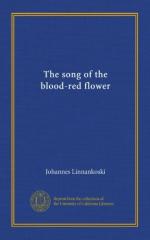The girl’s head was bent back, looking, not into his eyes as before, but upward. And he saw how the look in her eyes changed, first to ineffable tenderness, then to pious prayer—until it seemed freed from all earth, gazing at some blessed vision afar off. As long as she stood thus he could not move a limb. Then her eyelids quivered, closed—and she drew her lips away.
He looked at them, saw a white, bloodless line—and he felt in that moment as if some ineradicable, eternal seal had been pressed upon his own.
“I can’t leave you like this!” he cried desperately. “Look! To-night we shall be at Kirveskallio—I can come from there. And I will come every night as long as we are within reach.”
The girl’s face lit with a pale gleam as of autumn sunlight, but she said no word. Only looked at him strangely, as he had never seen her look before—and stood there, gazing at him still, as he passed out.
ROWAN
“Rowan—do you know why I call you so?” he asked, holding the girl’s hand clasped in his.
“It must have been because I blushed so when you spoke to me first,” she answered shyly.
“No, no! Guess again.”
“I can’t guess, I’m sure. I never thought why it was—only that it was a pretty name, and nice of you to call me so.”
“Did you think I should give you an ugly name?” said the young man, with a laugh. “But there’s much in that name, if you only knew.”
“Perhaps I know.” She looked at him trustingly as she spoke.
“Not altogether. But never mind—I’ll tell you some of it, though. See, this last spring was all so wonderful to me, somehow, and I was happy just to be alive. But then came the summer, and autumn: the grass began to wither, and the leaves turned yellow, and it made my heart ache to see.”
“You weren’t happy last summer?” she asked tenderly.
“No. You see, I could not forget the spring that had been so wonderful, and I was longing for it all the time. If I’d stayed in the same place, then perhaps.... But I’m a wanderer, once and for all....”
“Why do you never stay anywhere?”
“’Tis my nature, I suppose,” he answered, staring before him.
“And where were you—that time?” asked the girl timidly, watching his face.
“Oh, a long way off. Don’t ask of that. I’m not thinking of that spring now any more. It was only to tell you—who it was showed me that the autumn can be lovely, too.”
“Did someone show you that?”
“Yes, someone showed me—or, rather, I saw it the moment I set eyes on her.”
He took the girl’s hands in his, and looked into her eyes.
“It was a little cluster of rowan berries. When I saw you, you were like a young red rowan on the hillside. The birch was fading already, the ash stood solemn and dull, but you were there with the red berries, calling to me—no, not calling, but I saw you. And I stood and looked as if a miracle had come, and said to myself, should I speak to her, or just go by?”




